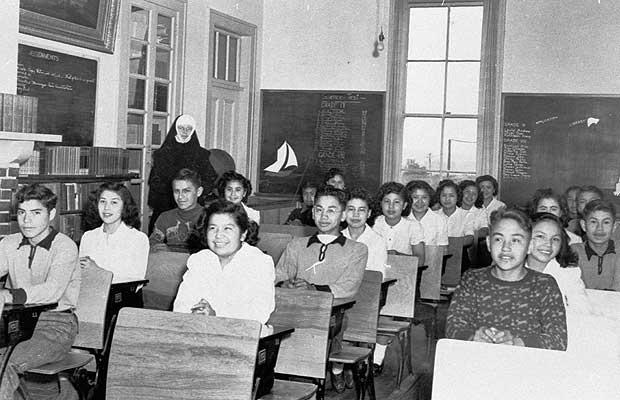The Province
February 23, 2011
http://www.theprovince.com/news/Conference+probes+eight+generations+residential+school+damage/4329430/story.html
 |
| Two years after the Canadian government issued an apology for Indian residential schools, the national chief of the Assembly of First Nations says there's still work to be done. |
WINNIPEG — Several generations of aboriginal people had their language and culture stripped away by residential schools, but it has been the generations that came after them that have continued to live with the effects.
Now a three-day national conference and workshop in Winnipeg is examining at the impact on the children of the survivors of the residential school system and looking for ways to help them.
Manitoba Court of Queen's Bench Justice Murray Sinclair, chairman of the three-member federal Truth and Reconciliation Commission, says that because generations of children passed through the residential schools, which began in the 1870s, it will take a long time to change the negative effects.
"There were seven generations — in some communities eight generations — of children who went through the residential school system so the effect is on eight or nine generations of children," Sinclair said on Tuesday. "And in each of those generations they had children. It will take a number of generations to get away from it.
"I'm convinced I will not see a complete reconciliation during my lifetime — and certainly not in the commission's. But my hope is the commission can set the goal clearly."
The Assembly of Manitoba Chiefs is holding the Hidden Legacy conference to look at the inter-generational effects of residential schools. The schools are blamed for the aboriginal communities' high rates of family violence, crime and alcohol and drug addiction.
Thousands of aboriginal children were taken from their communities and their parents to be educated at residential schools.
In 2008, Prime Minister Stephen Harper made a public apology for the abuse the school survivors suffered and the federal government paid $1.9 billion in compensation.
It also set up a Truth and Reconciliation Commission to gather stories from former students, staff, government and churches.
AMC Grand Chief Ron Evans said he's hoping the conference will help aboriginal young people understand the impact the residential schools had on earlier generations as well as themselves.
"It's important they talk about what has happened," he said. "Healing begins when you begin talking about it. They need to know why there may be dysfunction in their family. Then they can begin to break the cycle."
Jennifer Wood, the AMC's residential schools co-ordinator, said conference participants have come from across the country and, with more than 2,500 participants signed up by noon, it had exceeded expectations.
Wood said not only were the children of survivors in attendance, but also representatives from agencies that can help them, including social workers, corrections officers, politicians, and child and family workers.
"We know now the children were as greatly impacted as the survivors," she said.
"People will walk away from here with different healing methods . . . if we don't talk about it we won't understand it. We don't want this big elephant in the room any longer."
Dr. Gabor Mate, the staff physician at Vancouver's Portland Hotel, a residence and resource centre for the city's downtown and eastside residents, told the conference that aboriginal people were never genetically programmed to become addicts or else they would have been addicted to alcohol and drugs before Western civilization came in contact with them.
Mate said many aboriginal people became addicted as a way of dealing with the abuse they suffered at the schools. And he said the abuse didn't stop with the survivors themselves.
"When people are abused for generations then they can become abusers themselves," he said.
"The effect of residential schools has happened to people not even born yet."
Dr. Eduardo Duran, an American psychologist who specializes in the legacy of historic trauma, said when a person is abused the spirit of the perpetrator is taken in by the victim.
"The victim carries the spirit of the perpetrator inside them," Duran said.
"Trauma is a spirit. It is not a psychological idea. It has energy. It is listening to every word that is said here.
"We need to start thinking of it as an entity. If we can transform it then we can heal the soul wound."
Former MLA and MP Elijah Harper, who blocked passage of the Meech Lake accord when he was an MLA, criticized the federal government for only apologizing to aboriginal people for the treatment they received at residential schools.
"This would have been the time to recognize us as truly equal," Elijah Harper said. "The government has to apologize for the other laws and legislation that prevented us from being full participants in this country."
Any original material on these pages is copyright © BishopAccountability.org 2004. Reproduce freely with attribution.